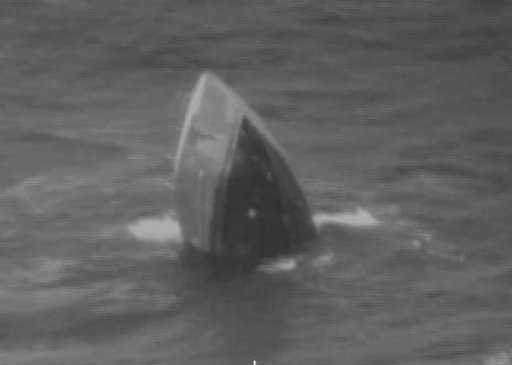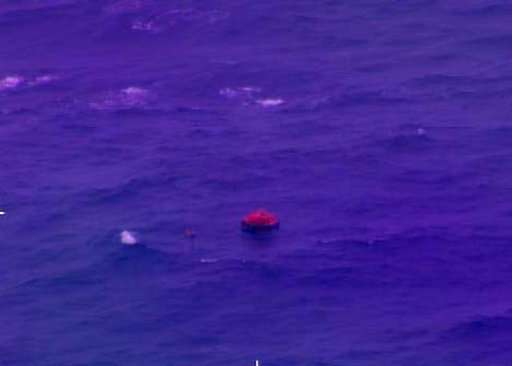In this image provided by the U.S. Coast Guard, the commercial longline fishing vessel Princess Hawaii sinks about 400 miles north of the Big Island on Sunday, March 25, 2018. Eight people, including the crew, captain and a federal fishery observer abandoned the ship and escaped in a life raft. A Coast Guard air crew dropped a radio to the life raft and helped establish communication with the vessel's sister ship, the Commander, which was fishing nearby and came to rescue the survivors. (U.S. Coast Guard via AP)
The owner of a fishing vessel that sank off Hawaii over the weekend said Tuesday two massive rogue waves hit the boat, swamping it and forcing the crew to abandon ship.
One wave hit the back of the of the 61-foot (19-meter) fishing vessel, the Princess Hawaii, and another hit the side, said owner Loc Nguyen in a telephone interview with The Associated Press. The boat was hundreds of miles off the coast of Hawaii's Big Island at the time.
"It was so big, they've never seen that before," Nguyen said. There was "too much water on the top and it went down."
Nguyen said the fishing crew had already set about 15 miles (24 kilometers) of line when the waves crashed, knocking five workers into the water. He said the captain, a federal observer and another crew member had been inside and were able to deploy the vessel's life raft.
The eight people aboard were rescued by the vessel's sister ship about 12 hours later. No injuries were reported.
Nguyen said he was "very happy" when he talked to the survivors and heard there were no injuries.
"I don't care very much about my boat," Nguyen said. "I lost money, OK. But if someone was dead or something, I would feel bad all my life."
According to the National Oceanic and Atmospheric Administration website, rogue waves are extremely rare but there are several known causes . Swells can travel at different speeds across the ocean, and as they pass through one another they can create "large, towering waves that quickly disappear."
In this image provided by the U.S. Coast Guard, the crew of the commercial longline fishing vessel Princess Hawaii floats in a life raft after their vessel sank about 400 miles north of the Big Island on Sunday, March 25, 2018. Eight people, including the crew, captain and a federal fishery observer abandoned the ship and escaped in the raft. A Coast Guard air crew dropped a radio to the life raft and helped establish communication with the vessel's sister ship, the Commander, which was fishing nearby and came to rescue the survivors. (U.S. Coast Guard via AP)
When waves caused by storms go against the normal current, very big waves can also form in the open ocean.
Robert Ballard, a National Weather Service meteorologist in Honolulu, said rogue waves can happen in and outside of storm systems and that it's even possible to have two waves come from different directions.
"We know that rogue waves can be up to twice or more the size of the seas, the average wave height," he said. But "we don't track particular rogue waves or anything like that."
According to the U.S. Coast Guard, the Princess Hawaii was was in 10-foot (3-meter) seas with winds around 20 mph (32 kph) when it sank.
© 2018 The Associated Press. All rights reserved.

























